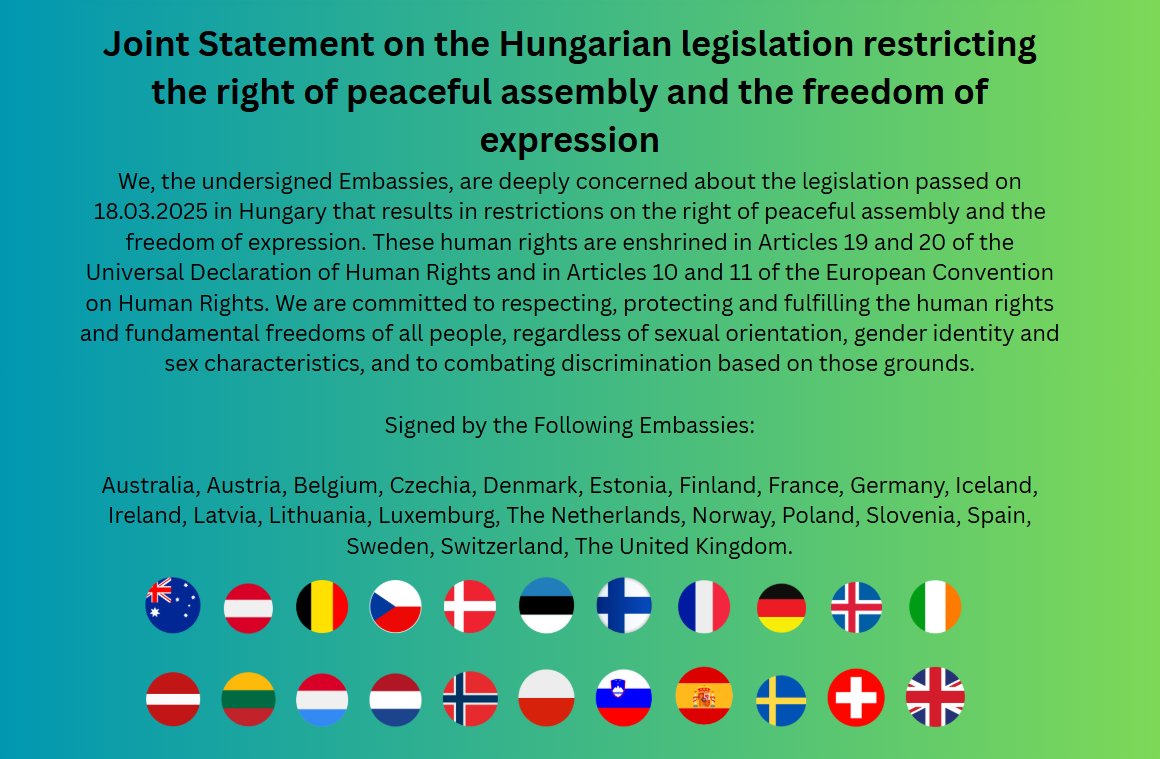22 ambassadors expressing serious concerns about Hungary’s new anti-Pride law – UPDATE: FM Szijjártó’s reaction

Based on the opposers (in Hungary and the world), the new law not only bans Pride marches but also restricts the right to peaceful assembly. Meanwhile, the Hungarian government believes that the new legislation aims only to ban Pride, which, according to them, can harm the development of children. Therefore, it is a means of child protection. It seems that 22 ambassadors believe in the former explanation instead of that of the Orbán cabinet.
According to a joint statement signed by 22 ambassadors in Budapest, the embassies are “deeply concerned about the legislation passed on 18.03.2025 in Hungary that results in restrictions on the right of peaceful assembly and the freedom of expression. These human rights are enshrined in Articles 19 and 20 of the Universal Declaration of Human Rights and Articles 10 and 11 of the European Convention on Human Rights. We are committed to respecting, protecting and fulfilling the human rights and fundamental freedoms of all people, regardless of sexual orientation, gender identity and sex characteristics, and to combating discrimination based on those grounds.

Among the countries signing the document are Czechia, France, Hungary’s most important business partner, Germany, Hungary’s millennium friend, Poland (we wrote about the latest developments in that regard HERE), and the UK. Among our neighbouring countries, only Slovenia and Austria signed the document.
Also, the Embassy of the United States, which had always been a member of such “coalitions” before the Trump cabinet recalled Ambassador David Pressman, did not sign the document.

FM Szijjártó: I would fire my ambassador if they signed such a document – UPDATE
Péter Szijjártó, Hungary’s foreign minister, slammed the joint statement of the 22 ambassadors to ATV. He repeated the Orbán cabinet’s old phrase about sovereignty protection and how sovereign Hungary is. Consequently, the Hungarian government does not accept foreign interventions from ambassadors appointed to Budapest. He added that Hungary did not interfere in their internal affairs.
That statement is not entirely true. We wrote HERE how Hungary intervened in Bosnia and Herzegovina, due to which the country’s leadership would like Hungarian peacekeeper units to leave the EUFOR ALTHEA mission (mainly because of Orbán’s deep friendship with Bosnian Serb entity leader Milorad Dodik). Furthermore, Hungary granted Former Polish Justice Minister Marcin Romanowski asylum, and we wrote HERE how the Hungarian government tried to influence the elections in North Macedonia and Slovenia.
Szijjártó added that if his ambassador participated in the signing of such a document, he would fire them. He highlighted that the sovereign Hungarian National Assembly elected by the Hungarian people is the only entity entitled to decide about Hungary’s laws.
Read also:







